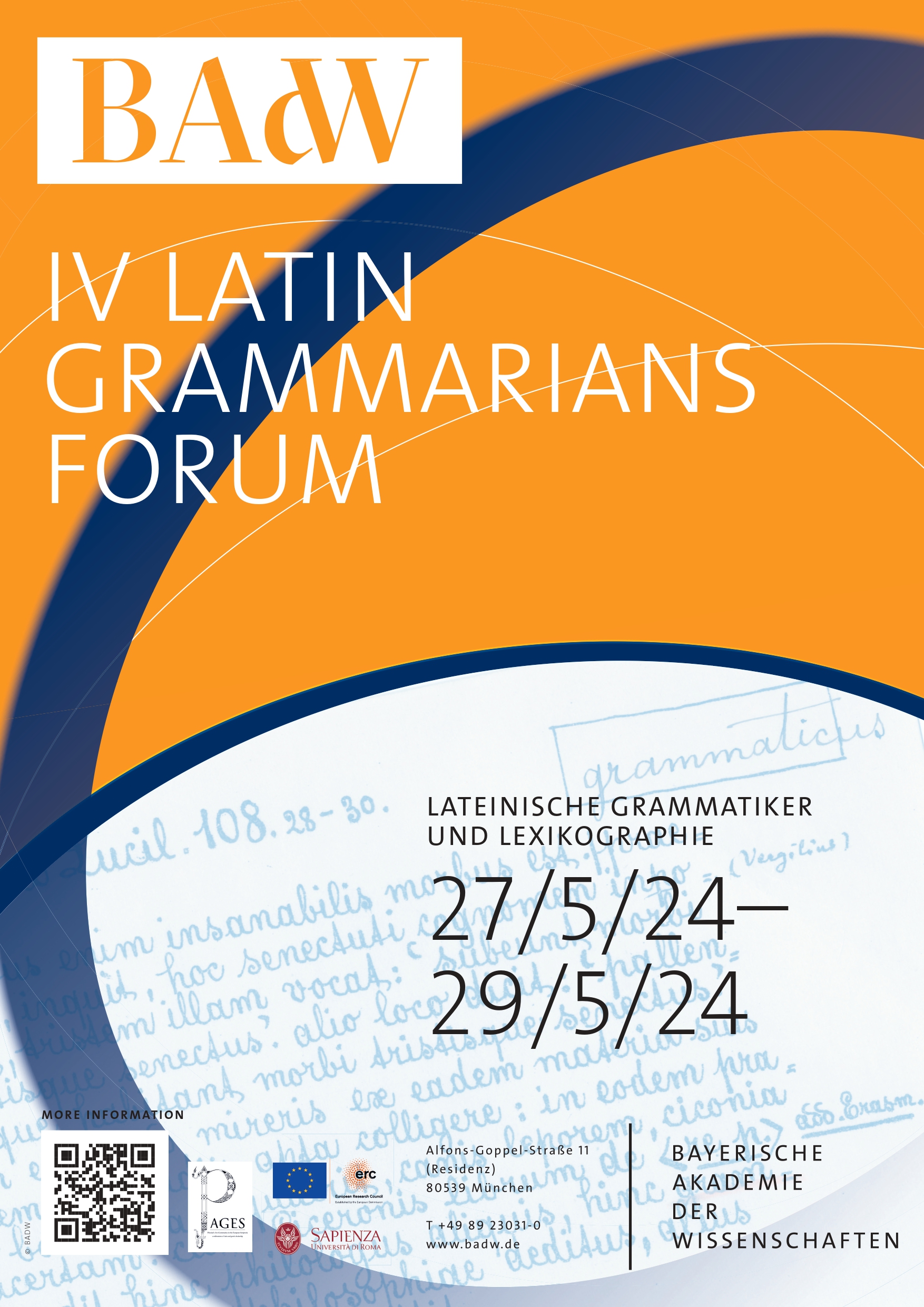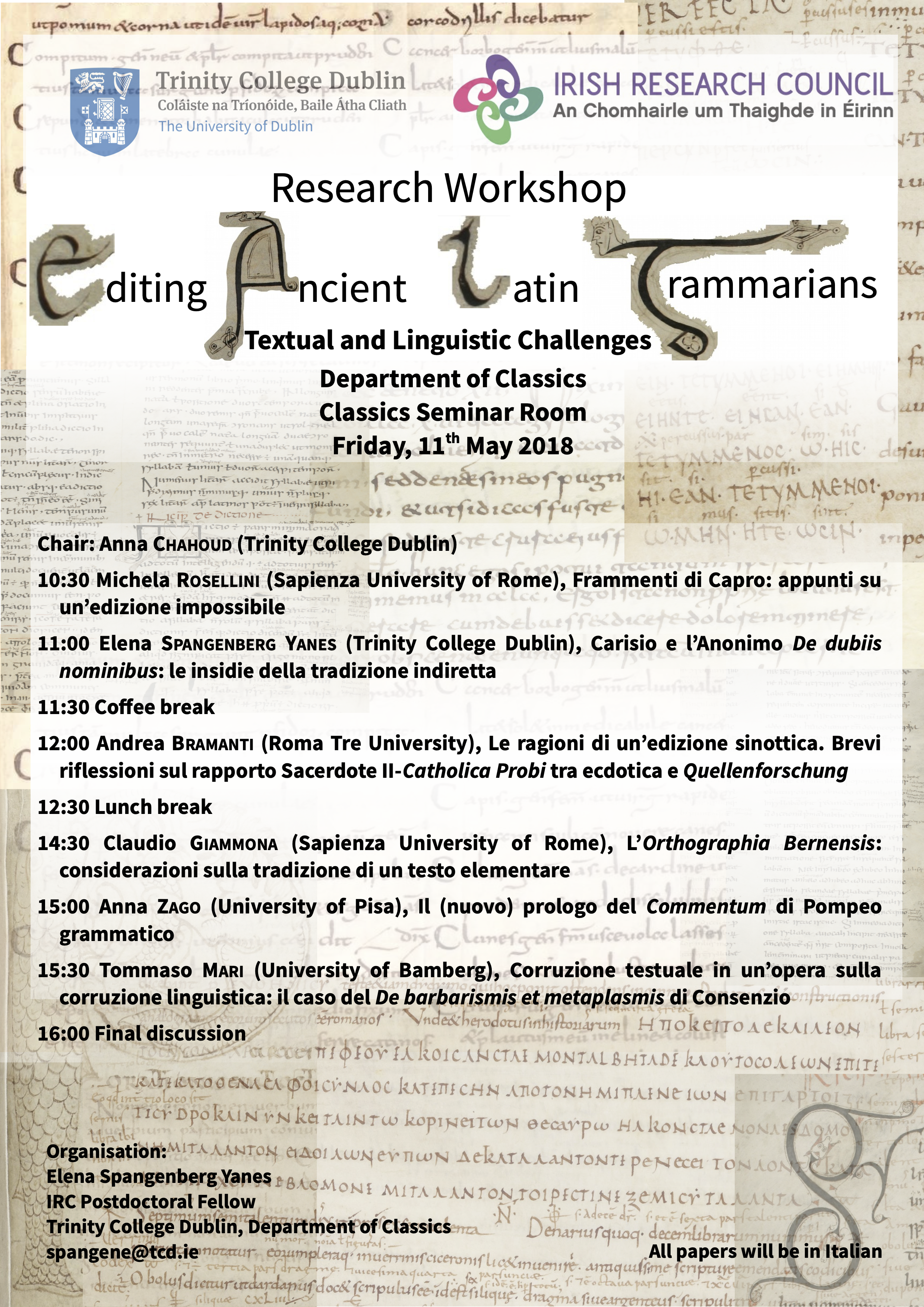Latin Grammarians Forum
The core of the Latin Grammarians Forum is the development of an international network of both advanced and early-career scholars in the specific field of ancient, late antique, and early medieval Latin grammarians (1st cent. BC – 9th cent. AD). Scientific goals of the network are: 1) the coordination and dissemination of a series of individual studies on manuscript transmission, textual criticism, and linguistics of various works; 2) the promotion of collaborations with international research groups in the field; 3) the elaboration of major common research programmes.
Latin grammarians are an important subject in classical studies. Their work has laid the foundations of linguistics as a science and influenced language teaching in Western Europe until the present day. Moreover, they represent one of the richest sources of Greek and Latin fragmentary literatures and witness to wide cultural issues such as bilingualism and history of education. This field of studies is recently undergoing a significant revival with the prestigious Collectanea Grammatica Latina (CGL, Georg Olms Verlag), the series of critical texts of Latin grammarians which is superseding and completing Keil's Grammatici Latini, and collaborative initiatives in Italy (digital critical editions of several Latin grammarians, funded by the Italian government in 2019) and France (Groupe Ars Grammatica: first translation of Priscian into a modern language). The Latin Grammarians Forum will have a significant impact on both the specific field, which is still largely relying on 19th-century scholarship, and wider subjects, such as palaeography, history of linguistics, ancient and medieval bilingualism, and classical literatures, their transmission and reception.
The three objectives outlined above have so far been pursued by strengthening the methodological coherence of the network in a series of research workshops held at Trinity College Dublin (Department of Classics, 2018 and 2019), Sapienza University of Rome (Dipartimento di Scienze dell’Antichità, 2021), and the Thesaurus linguae Latinae (Munich, 2024). The initiative has been funded by the Irish Research Council (Government of Ireland Postdoctoral Fellowship 2017, awarded to Dr. Elena Spangenberg Yanes), by the Trinity Long Room Hub (Research Incentive Scheme 2018/19, led by Prof. Dr. Anna Chahoud and Dr. Spangenberg Yanes), Sapienza University of Rome (Bando Convegni, Seminari e Workshop 2019, awarded to Prof. Dr. Michela Rosellini), by the Bayerische Akademie der Wissenschaften and the European Research Council project PAGES, n° 882588 (led by Prof. Dr. Michela Rosellini). The next meeting is already planned and will take place on 16-18 December 2026 at Sapienza University of Rome. See below for the detailed programmes of the past events.
The network involves already 18 scholars based at 10 different institutions in 5 European countries. Further interdisciplinary collaborations engage experts in palaeography, Digital Humanities, Renaissance studies, and physics (multispectral analysis of manuscripts).
List of the members: Dr. Andrea Bramanti (Roma Sapienza); Prof. Dr. Anna Chahoud (Trinity College Dublin); Dr. Andrea Consalvi (Roma Sapienza); Prof. Mario De Nonno (Roma Tre); Prof. Paolo De Paolis (Verona); Dr. Fatima El Matouni (Verona); MA Jessica Felici (Pisa Normale); Prof. Dr. Alessandro Garcea (Sorbonne Paris IV); Dr. Adam Gitner (Munich, Thesaurus linguae Latinae); Prof. Dr. Claudio Giammona (Roma Sapienza); MA Silvia Luka (Verona); Dr. Tommaso Mari (independent researcher); Dr. Pádraic Moran (Galway), Prof. Dr. Costas Panayotakis (Glasgow); Dr. Stefano Poletti (Freiburg i. B.); Dr. Camilla Poloni (indepdent researcher); Prof. Dr. Michela Rosellini (Roma Sapienza); Dr. Elena Spangenberg Yanes (Roma Sapienza); Dr. Anna Zago (Pisa).






